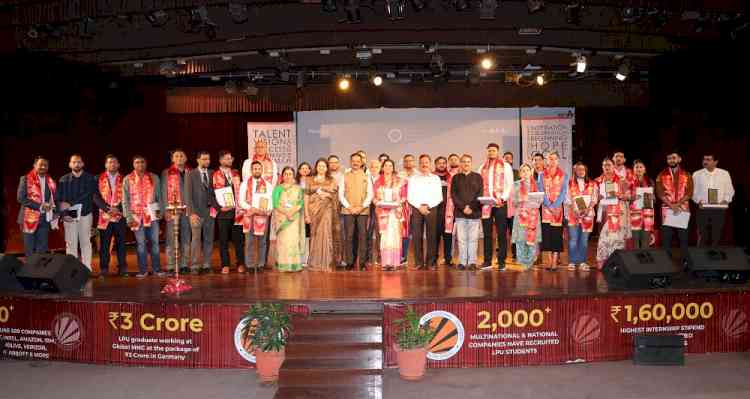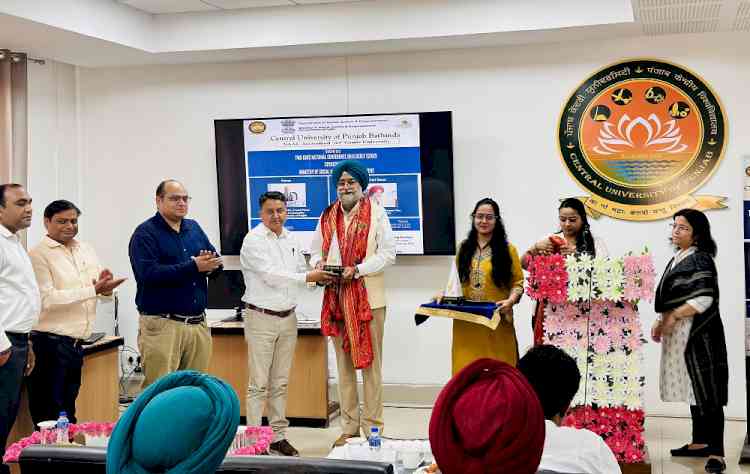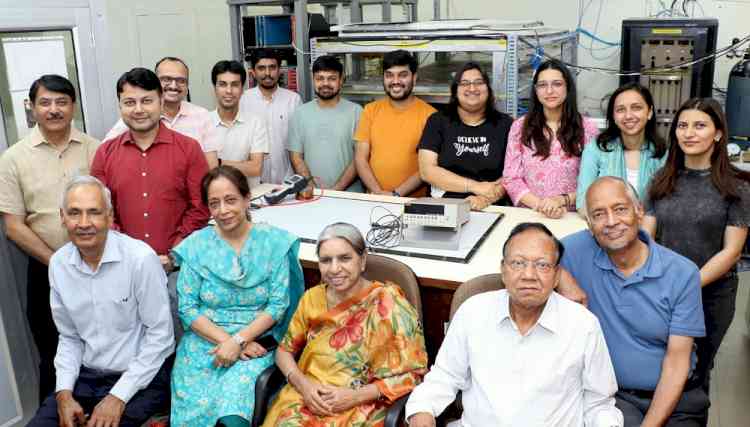Panjab University held Institution's Innovation Council regional meet for 2023
Panjab University, Chandigarh, today held the Institution's Innovation Council (IIC) regional meet for 2023. The first inaugural session included open house events such as YUKTI innovation/start-up demonstrations, display of IIC posters, KARTVYABODH and pitching sessions, and an entrepreneurs market called Udyami Bazaar.

Chandigarh, November 21, 2023: Panjab University, Chandigarh, today held the Institution's Innovation Council (IIC) regional meet for 2023. The first inaugural session included open house events such as YUKTI innovation/start-up demonstrations, display of IIC posters, KARTVYABODH and pitching sessions, and an entrepreneurs market called Udyami Bazaar.
Following major transformations; PU has been selected as the first host institution to organize a meet with multiple tracks, including innovation panel discussions, knowledge-sharing sessions, and an orientation session for YUKTI Innovation Challenge, and a one-to-one mentoring cum pitching session. An entrepreneur market called "Udyami Bazaar" was set up for innovators to sell their innovative products and promote their brands. KARTAVYABODH and open interactive sessions are some of the new initiatives implemented, which involved some extracurricular activities to engage innovators. Pitching sessions and one-on-one mentoring provided guidance to entrepreneurs in this region, and a few selected start-ups will be nominated for national investment of up to 10 Lakhs.
Round table discussions on innovation with angel investors, incubators, and resource agencies were aimed at setting the foundation for the growth of the entrepreneurial ecosystem. IIC institutions conducted knowledge-sharing sessions, with a focus on IP commercialization and technology transfer. Some YUKTI innovators had the opportunity to demonstrate their technology/products in front of panelists, and the best innovators and IIC posters were felicitated at the valedictory session. The event saw participation from numerous startups and entrepreneurs. The second inaugural session took place in the Law auditorium, where the event was graced by Professor T. G. Sitharam, Chairman of AITCE, attending as the chief guest. In a recent panel discussion, Professor Sitharam emphasized the need for more innovative ideas and addressed the basic problems faced by innovators and startups. He emphasized the importance of "Job Creators, not Job Seekers" and discussed the role of universities in sustainable development. He advised students to employ green chemistry and attend training programs to enhance their skills. Smt. Jaspreet Talwar, an IAS officer serving as the Principal Secretary of the Department of Employment Generation, Skill Development, and Training in Punjab, was the guest of honour and addressed the audience of innovators and entrepreneurs from various sectors. Shri Devinder Pal Singh Kharbanda, also an IAS officer and currently serving as the Director of Industries and Commerce in the Government of Punjab, enlightened the audience about the various schemes and programs available to support new startup innovations and entrepreneurs. Shri Dipan Sahu, the Assistant Innovation Director at the Ministry of Education's Innovation Cell AICTE, was a guest of honour. He explained the agenda and workings of the IIC council. This event is being conducted under the banner of Atma-nirbhar-Bharat, with the aim of promoting the vision of the Make-in-India campaign among start-ups, entrepreneurs, IIC institutes, and innovators. The event was guided by Prof. Renu Vig, the Vice Chancellor of Panjab University, to ensure its success and effectiveness. The above were accompanied by Prof. Rubina Sethi, Dean of University Instructions, Prof. Y. P. Verma, Registrar, Panjab University, Chandigarh and Dr. Sonal Singhal, President, IIC committee, Panjab University, Chandigarh.
Throughout the day, several meetings were held at different venues within the university. These included an Innovation Round Table Discussion and an IIC Consortium Meeting at the Golden Jubilee Hall, Panjab University. The main panelists were Dr. Ashutosh Pastor, Senior Manager and Head of Incubation at the Foundation for Innovation and Technology Transfer, IIT Delhi, Delhi, as well as Mr. Vineet Khurana and Mr. Anil Narang. Additionally, there were Knowledge Sharing Sessions by IIC Institutions at the University Main Auditorium, and an Orientation Session for the YUKTI Innovation Challenge, followed by one-on-one mentoring and pitching sessions at the Department of Zoology's main auditorium, Panjab University.
All of these initiatives will set a benchmark for upcoming meets and ecosystem development initiatives. At the end of the day, everyone will have something to take away.
Brief history of the program:
In the year 2018, the Ministry of Education (MoE) through MoE’s Innovation Cell (MIC) launched the Institution’s Innovation Council (IIC) program in collaboration with AICTE for Higher Educational Institutions (HEIs) to systematically foster the culture of innovation and start-up ecosystem in education institutions. Primarily, IICs’ role is to engage a large number of faculty, students, and staff in various innovation and entrepreneurship-related activities such as ideation, Problem-solving, Proof of Concept development, Design Thinking, IPR, project handling and management at the Pre-incubation/Incubation stage, etc., so that innovation and entrepreneurship ecosystem gets established and stabilized in HEIs. The IIC model is designed to address the existing challenges/issues in HEIs such as fewer numbers, occasional and unplanned Innovation & Entrepreneurship (I&E) activities organised in HEIs with low involvement of top leadership, lack of coherence and absence of synergy in resource mobilization, deployment and underutilization of creative potential of youths as a major barrier for vibrant I&E ecosystem to emerge from HEIs.
The IIC model is unique and distinct as it integrates the functionalities of flexibility calendar activities, a scoring and reward system, decentralizing operation with the division of work, progress monitoring, and incentive mechanisms in a coordinated manner through a robust digital platform. In the last two years, undoubtedly, IIC has emerged as a very sustainable and scalable model for promoting innovation within HEIs and the efforts of these IIC Institutes can be seen as an impactful contribution towards making the country’s innovation and start-up ecosystem more vibrant and dynamic. The recent achievement of India’s 48th position in the Global Innovation Index (GII) ranking is a reflection of the same.


 City Air News
City Air News 








